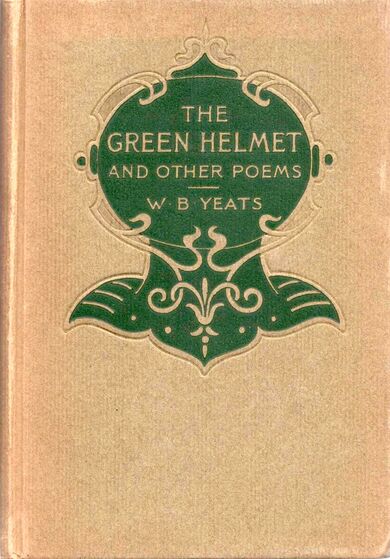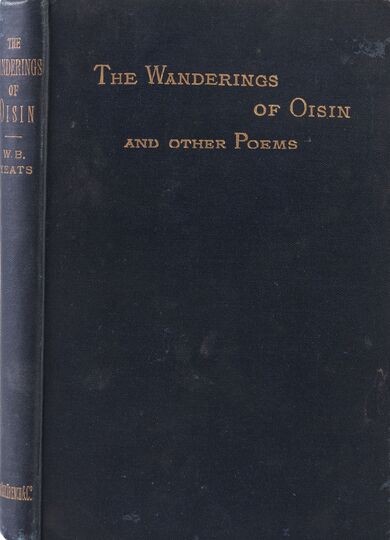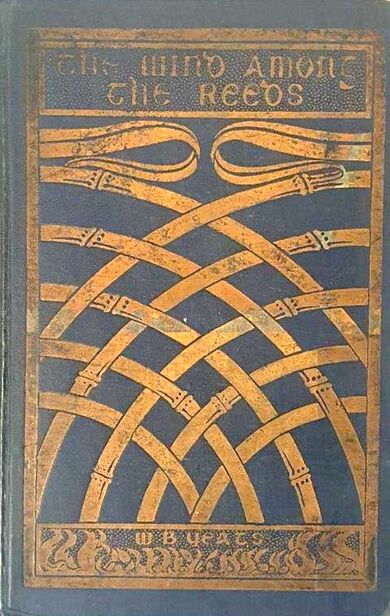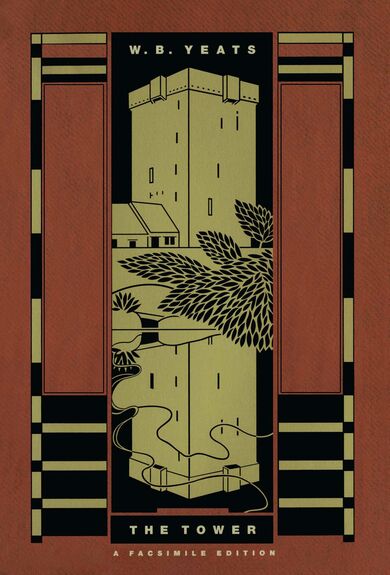An Heroic Farce
Scene: A house made of logs. There are two windows at the back and a door which cuts off one of the corners of the room. Through the door one can see low rocks which make the ground outside higher than it is within, and beyond the rocks a misty moon-lit sea. Through the windows one can see nothing but the sea. There is a great chair at the opposite side to the door, and in front of it a table with cups and a flagon of ale. Here and there are stools.
At the Abbey Theatre the house is orange red and the chairs and tables and flagons black, with a slight purple tinge which is not clearly distinguishable from the black. The rocks are black with a few green touches. The sea is green and luminous, and all the characters except the Red Man and the Black Men are dressed in various shades of green, one or two with touches of purple which look nearly black. The Black Men all wear dark purple and have eared caps, and at the end their eyes should look green from the reflected light of the sea. The Red Man is altogether in red. He is very tall, and his height increased by horns on the Green Helmet. The effect is intentionally violent and startling.
Laegaire
What is that? I had thought that I saw, though but in the wink of an eye,
A cat-headed man out of Connaught go pacing and spitting by;
But that could not be.
Conall
You have dreamed it—there’s nothing out there.
I killed them all before daybreak—I hoked them out of their lair;
I cut off a hundred heads with a single stroke of my sword,
And then I danced on their graves and carried away their hoard.
Laegaire
Does anything stir on the sea?
Conall
Not even a fish or a gull:
I can see for a mile or two, now that the moon’s at the full.
[A distant shout.]
Laegaire
Ah—there—there is someone who calls us.
Conall
But from the landward side,
And we have nothing to fear that has not come up from the tide;
The rocks and the bushes cover whoever made that noise,
But the land will do us no harm.
Laegaire
It was like Cuchulain’s voice.
Conall
But that’s an impossible thing.
Laegaire
An impossible thing indeed.
Conall
For he will never come home, he has all that he could need
In that high windy Scotland—good luck in all that he does.
Here neighbour wars on neighbour and why there is no man knows,
And if a man is lucky all wish his luck away,
And take his good name from him between a day and a day.
Laegaire
I would he’d come for all that, and make his young wife know
That though she may be his wife, she has no right to go
Before your wife and my wife, as she would have gone last night
Had they not caught at her dress, and pulled her as was right;
And she makes light of us though our wives do all that they can.
She spreads her tail like a peacock and praises none but her man.
Conall
A man in a long green cloak that covers him up to the chin
Comes down through the rocks and hazels.
Laegaire
Cry out that he cannot come in.
Conall
He must look for his dinner elsewhere, for no one alive shall stop
Where a shame must alight on us two before the dawn is up.
Laegaire
No man on the ridge of the world must ever know that but us two.
Conall
[Outside door]
Go away, go away, go away.
Young Man
[Outside door]
I will go when the night is through
And I have eaten and slept and drunk to my heart’s delight.
Conall
A law has been made that none shall sleep in this house to-night.
Young Man
Who made that law?
Conall
We made it, and who has so good a right?
Who else has to keep the house from the Shape-Changers till day?
Young Man
Then I will unmake the law, so get you out of the way.
[He pushes past Conall and goes into house]
Conall
I thought that no living man could have pushed me from the door,
Nor could any living man do it but for the dip in the floor;
And had I been rightly ready there’s no man living could do it,
Dip or no dip.
Laegaire
Go out—if you have your wits, go out,
A stone’s throw further on you will find a big house where
Our wives will give you supper, and you’ll sleep sounder there,
For it’s a luckier house.
Young Man
I’ll eat and sleep where I will.
Laegaire
Go out or I will make you.
Young Man
[Forcing up Laegaire’s arm, passing him and putting his shield on the wall over the chair]
Not till I have drunk my fill.
But may some dog defend me for a cat of wonder’s up.
Laegaire and Conall are here, the flagon full to the top,
And the cups—
Laegaire
It is Cuchulain.
Cuchulain
The cups are dry as a bone.
[He sits on chair and drinks]
Conall
Go into Scotland again, or where you will, but begone
From this unlucky country that was made when the devil spat.
Cuchulain
If I lived here a hundred years, could a worse thing come than that
Laegaire and Conall should know me and bid me begone to my face?
Conall
We bid you begone from a house that has fallen on shame and disgrace.
Cuchulain
I am losing patience, Conall—I find you stuffed with pride,
The flagon full to the brim, the front door standing wide;
You’d put me off with words, but the whole thing’s plain enough,
You are waiting for some message to bring you to war or love
In that old secret country beyond the wool-white waves,
Or it may be down beneath them in foam-bewildered caves
Where nine forsaken sea queens fling shuttles to and fro;
But beyond them, or beneath them, whether you will or no,
I am going too.
Laegaire
Better tell it all out to the end;
He was born to luck in the cradle, his good luck may amend
The bad luck we were born to.
Conall
I’ll lay the whole thing bare.
You saw the luck that he had when he pushed in past me there.
Does anything stir on the sea?
Laegaire
Not even a fish or a gull.
Conall
You were gone but a little while. We were there and the ale-cup full.
We were half drunk and merry, and midnight on the stroke
When a wide, high man came in with a red foxy cloak,
With half-shut foxy eyes and a great laughing mouth,
And he said when we bid him drink, that he had so great a drouth
He could drink the sea.
Cuchulain
I thought he had come from one of you
Out of some Connaught rath, and would lap up milk and mew;
But if he so loved water I have the tale awry.
Conall
You would not be so merry if he were standing by,
For when we had sung or danced as he were our next of kin
He promised to show us a game, the best that ever had been;
And when we had asked what game, he answered, “Why, whip off my head!
Then one of you two stoop down, and I’ll whip off his,” he said.
“A head for a head,” he said, “that is the game that I play.”
Cuchulain
How could he whip off a head when his own had been whipped away?
Conall
We told him it over and over, and that ale had fuddled his wit,
But he stood and laughed at us there, as though his sides would split,
Till I could stand it no longer, and whipped off his head at a blow,
Being mad that he did not answer, and more at his laughing so,
And there on the ground where it fell it went on laughing at me.
Laegaire
Till he took it up in his hands—
Conall
And splashed himself into the sea.
Cuchulain
I have imagined as good when I’ve been as deep in the cup.
Laegaire
You never did.
Cuchulain
And believed it.
Conall
Cuchulain, when will you stop
Boasting of your great deeds, and weighing yourself with us two,
And crying out to the world whatever we say or do,
That you’ve said or done a better?—Nor is it a drunkard’s tale,
Though we said to ourselves at first that it all came out of the ale,
And thinking that if we told it we should be a laughing-stock,
Swore we should keep it secret.
Laegaire
But twelve months upon the clock.
Conall
A twelvemonth from the first time.
Laegaire
And the jug full up to the brim:
For we had been put from our drinking by the very thought of him.
Conall
We stood as we’re standing now.
Laegaire
The horns were as empty.
Conall
When
He ran up out of the sea with his head on his shoulders again.
Cuchulain
Why, this is a tale worth telling.
Conall
And he called for his debt and his right,
And said that the land was disgraced because of us two from that night
If we did not pay him his debt.
Laegaire
What is there to be said
When a man with a right to get it has come to ask for your head?
Conall
If you had been sitting there you had been silent like us.
Laegaire
He said that in twelve months more he would come again to this house
And ask his debt again. Twelve months are up to-day.
Conall
He would have followed after if we had run away.
Laegaire
Will he tell every mother’s son that we have broken our word?
Cuchulain
Whether he does or does not we’ll drive him out with the sword,
And take his life in the bargain if he but dare to scoff.
Conall
How can you fight with a head that laughs when you’ve whipped it off?
Laegaire
Or a man that can pick it up and carry it out in his hand?
Conall
He is coming now, there’s a splash and a rumble along the strand
As when he came last.
Cuchulain
Come, and put all your backs to the door.
[A tall, red-headed, red-cloaked man stands upon the threshold against the misty green of the sea; the ground, higher without than within the house, makes him seem taller even than he is. He leans upon a great two-handed sword]
Laegaire
It is too late to shut it, for there he stands once more
And laughs like the sea.
Cuchulain
Old herring—You whip off heads! Why, then
Whip off your own, for it seems you can clap it on again.
Or else go down in the sea, go down in the sea, I say,
Find that old juggler Manannan and whip his head away;
Or the Red Man of the Boyne, for they are of your own sort,
Or if the waves have vexed you and you would find a sport
Of a more Irish fashion, go fight without a rest
A caterwauling phantom among the winds of the west.
But what are you waiting for? into the water, I say!
If there’s no sword can harm you, I’ve an older trick to play,
An old five-fingered trick to tumble you out of the place;
I am Sualtim’s son Cuchulain—what, do you laugh in my face?
Red Man
So you too think me in earnest in wagering poll for poll!
A drinking joke and a gibe and a juggler’s feat, that is all,
To make the time go quickly—for I am the drinker’s friend,
The kindest of all Shape-Changers from here to the world’s end,
The best of all tipsy companions. And now I bring you a gift:
I will lay it there on the ground for the best of you all to lift,
[He lays his Helmet on the ground]
And wear upon his own head, and choose for yourselves the best.
O! Laegaire and Conall are brave, but they were afraid of my jest.
Well, maybe I jest too grimly when the ale is in the cup.
There, I’m forgiven now—
[Then in a more solemn voice as he goes out]
Let the bravest take it up.
[Conall takes up Helmet and gazes at it with delight]
Laegaire
[Singing, with a swaggering stride]
Laegaire is best;
Between water and hill,
He fought in the west
With cat heads, until
At the break of day
All fell by his sword,
And he carried away
Their hidden hoard.
[He seizes the Helmet]
Conall
Give it me, for what did you find in the bag
But the straw and the broken delf and the bits of dirty rag
You’d taken for good money?
Cuchulain
No, no, but give it me.
[He takes Helmet]
Conall
The Helmet’s mine or Laegaire’s—you’re the youngest of us three.
Cuchulain
[Filling Helmet with ale]
I did not take it to keep it—the Red Man gave it for one,
But I shall give it to all—to all of us three or to none;
That is as you look upon it—we will pass it to and fro,
And time and time about, drink out of it and so
Stroke into peace this cat that has come to take our lives.
Now it is purring again, and now I drink to your wives,
And I drink to Emer, my wife.
[A great noise without and shouting]
Why, what in God’s name is that noise?
Conall
What else but the charioteers and the kitchen and stable boys
Shouting against each other, and the worst of all is your own,
That chariot-driver, Laeg, and they’ll keep it up till the dawn,
And there’s not a man in the house that will close his eyes to-night,
Or be able to keep them from it, or know what set them to fight.
[A noise of horns without]
There, do you hear them now? such hatred has each for each
They have taken the hunting horns to drown one other’s speech
For fear the truth may prevail.—Here’s your good health and long life,
And, though she be quarrelsome, good health to Emer, your wife.
[The Charioteers, Stable Boys and Kitchen Boys come running in. They carry great horns, ladles and the like]
Laeg
I am Laeg, Cuchulain’s driver, and my master’s cock of the yard.
Another
Conall would scatter his feathers.
[Confused murmurs]
Laegaire
[To Cuchulain]
No use, they won’t hear a word.
Conall
They’ll keep it up till the dawn.
Another
It is Laegaire that is the best,
For he fought with cats in Connaught while Conall took his rest
And drained his ale pot.
Another
Laegaire—what does a man of his sort
Care for the like of us! He did it for his own sport.
Another
It was all mere luck at the best.
Another
But Conall, I say—
Another
Let me speak.
Laeg
You’d be dumb if the cock of the yard would but open his beak.
Another
Before your cock was born, my master was in the fight.
Laeg
Go home and praise your grand-dad. They took to the horns for spite,
For I said that no cock of your sort had been born since the fight began.
Another
Conall has got it, the best man has got it, and I am his man.
Cuchulain
Who was it started this quarrel?
A Stable Boy
It was Laeg.
Another
It was Laeg done it all.
Laeg
A high, wide, foxy man came where we sat in the hall,
Getting our supper ready, with a great voice like the wind,
And cried that there was a helmet, or something of the kind,
That was for the foremost man upon the ridge of the earth.
So I cried your name through the hall,
[The others cry out and blow horns, partly drowning the rest of his speech]
but they denied its worth,
Preferring Laegaire or Conall, and they cried to drown my voice;
But I have so strong a throat that I drowned all their noise
Till they took to the hunting horns and blew them into my face,
And as neither side would give in—we would settle it in this place.
Let the Helmet be taken from Conall.
A Stable Boy
No, Conall is the best man here.
Another
Give it to Laegaire that made the murderous cats pay dear.
Cuchulain
It has been given to none: that our rivalry might cease,
We have turned that murderous cat into a cup of peace.
I drank the first; and then Conall; give it to Laegaire now,
[Conall gives Helmet to Laegaire]
That it may purr in his hand and all of our servants know
That since the ale went in, its claws went out of sight.
A Servant
That’s well—I will stop my shouting.
Another
Cuchulain is in the right;
I am tired of this big horn that has made me hoarse as a rook.
Laeg
Cuchulain, you drank the first.
Another
By drinking the first he took
The whole of the honours himself.
Laeg
Cuchulain, you drank the first.
Another
If Laegaire drink from it now he claims to be last and worst.
Another
Cuchulain and Conall have drunk.
Another
He is lost if he taste a drop.
Laegaire
[Laying Helmet on table]
Did you claim to be better than us by drinking first from the cup?
Cuchulain
[His words are partly drowned by the murmurs of the crowd though he speaks very loud]
That juggler from the sea, that old red herring it is
Who has set us all by the ears—he brought the Helmet for this,
And because we would not quarrel he ran elsewhere to shout
That Conall and Laegaire wronged me, till all had fallen out.
[The murmur grows less so that his words are heard]
Who knows where he is now or who he is spurring to fight?
So get you gone, and whatever may cry aloud in the night,
Or show itself in the air, be silent until morn.
A Servant
Cuchulain is in the right—I am tired of this big horn.
Cuchulain
Go!
[The Servants turn toward the door but stop on hearing the voices of Women outside]
Laegaire’s Wife
[Without]
Mine is the better to look at.
Conall’s Wife
[Without]
But mine is better born.
Emer
[Without]
My man is the pithier man.
Cuchulain
Old hurricane, well done!
You’ve set our wives to the game that they may egg us on;
We are to kill each other that you may sport with us.
Ah, now, they’ve begun to wrestle as to who’ll be first at the house.
[The Women come to the door struggling]
Emer
No, I have the right of place for I married the better man.
Conall’s Wife
[Pulling Emer back]
My nails in your neck and shoulder.
Laegaire’s Wife
And go before me if you can.
My husband fought in the West.
Conall’s Wife
[Kneeling in the door so as to keep the others out who pull at her]
But what did he fight with there
But sidelong and spitting and helpless shadows of the dim air?
And what did he carry away but straw and broken delf?
Laegaire’s Wife
Your own man made up that tale trembling alone by himself,
Drowning his terror.
Emer
[Forcing herself in front]
I am Emer, it is I go first through the door.
No one shall walk before me, or praise any man before
My man has been praised.
Cuchulain
[Spreading his arms across the door so as to close it]
Come, put an end to their quarrelling:
One is as fair as the other, and each one the wife of a king.
Break down the painted boards between the sill and the floor
That they come in together, each one at her own door.
[Laegaire and Conall begin to break out the bottoms of the windows, then their wives go to the windows, each to the window where her husband is. Emer stands at the door and sings while the boards are being broken out]
Emer
Nothing that he has done,
His mind that is fire,
His body that is sun,
Have set my head higher
Than all the world’s wives.
Himself on the wind
Is the gift that he gives,
Therefore womenkind,
When their eyes have met mine,
Grow cold and grow hot,
Troubled as with wine
By a secret thought,
Preyed upon, fed upon
By jealousy and desire.
I am moon to that sun,
I am steel to that fire,
[The windows are now broken down to floor. Cuchulain takes his spear from the door, and the three Women come in at the same moment]
Emer
Cuchulain, put off this sloth and awake:
I will sing till I’ve stiffened your lip against every knave that would take
A share of your honour.
Laegaire’s Wife
You lie, for your man would take from my man.
Conall’s Wife
[To Laegaire’s Wife]
You say that, you double-face, and your own husband began.
Cuchulain
[Taking up Helmet from table]
Town land may rail at town land till all have gone to wrack,
The very straws may wrangle till they’ve thrown down the stack;
The very door-posts bicker till they’ve pulled in the door,
The very ale-jars jostle till the ale is on the floor,
But this shall help no further.
[He throws Helmet into the sea]
Laegaire’s Wife
It was not for your head,
And so you would let none wear it, but fling it away instead.
Conall’s Wife
But you shall answer for it, for you’ve robbed my man by this.
Conall
You have robbed us both, Cuchulain.
Laegaire
The greatest wrong there is
On the wide ridge of the world has been done to us two this day.
Emer
[Drawing her dagger]
Who is for Cuchulain?
Cuchulain
Silence!
Emer
Who is for Cuchulain, I say?
[She sings the same words as before, flourishing her dagger about. While she is singing, Conall’s Wife and Laegaire’s 85 Wife draw their daggers and run at her, but Cuchulain forces them back. Laegaire and Conall draw their swords to strike Cuchulain]
Laegaire’s Wife
[Crying out so as to be heard through Emer’s singing]
Deafen her singing with horns!
Conall’s Wife
Cry aloud! blow horns! make a noise!
Laegaire’s Wife
Blow horns, clap hands, or shout, so that you smother her voice!
[The Horse Boys and Scullions blow their horns or fight among themselves. There is a deafening noise and a confused fight. Suddenly three black hands come through the windows and put out the torches. It is now pitch dark, but for a faint light outside the house which merely shows that there are moving forms, but not who or what they are, and in the darkness one can hear low terrified voices]
A Voice
Coal-black, and headed like cats, they came up over the strand.
Another Voice
And I saw one stretch to a torch and cover it with his hand.
Another Voice
Another sooty fellow has plucked the moon from the air.
[A light gradually comes into the house from the sea, on which the moon begins to show once more. There is no light within the house, and the great beams of the walls are dark and full of shadows, and the persons of the play dark too against the light. The Red Man is seen standing in the midst of the house. The black cat-headed Men crouch and stand about the door. One carries the Helmet, one the great sword]
Red Man
I demand the debt that’s owing. Let some man kneel down there
That I may cut his head off, or all shall go to wrack.
Cuchulain
He played and paid with his head and it’s right that we pay him back,
And give him more than he gave, for he comes in here as a guest:
So I will give him my head.
[Emer begins to keen]
Little wife, little wife, be at rest.
Alive I have been far off in all lands under sun,
And been no faithful man; but when my story is done
My fame shall spring up and laugh, and set you high above all.
Emer
[Putting her arms about him]
It is you, not your fame, that I love.
Cuchulain
[Tries to put her from him]
You are young, you are wise, you can call
Some kinder and comelier man that will sit at home in the house.
Emer
Live and be faithless still.
Cuchulain
[Throwing her from him]
Would you stay the great barnacle-goose
When its eyes are turned to the sea and its beak to the salt of the air?
Emer
[Lifting her dagger to stab herself]
I, too, on the grey wing’s path.
Cuchulain
[Seizing dagger]
Do you dare, do you dare, do you dare?
Bear children and sweep the house.
[Forcing his way through the Servants who gather round]
Wail, but keep from the road.
[He kneels before Red Man. There is a pause]
Quick to your work, old Radish, you will fade when the cocks have crowed.
[A black cat-headed Man holds out the Helmet. The Red Man takes it]
Red Man
I have not come for your hurt, I’m the Rector of this land,
And with my spitting cat-heads, my frenzied moon-bred band,
Age after age I sift it, and choose for its championship
The man who hits my fancy.
[He places the Helmet on Cuchulain’s head]
And I choose the laughing lip
That shall not turn from laughing whatever rise or fall,
The heart that grows no bitterer although betrayed by all;
The hand that loves to scatter; the life like a gambler’s throw;
And these things I make prosper, till a day come that I know,
When heart and mind shall darken that the weak may end the strong,
And the long remembering harpers have matter for their song.





